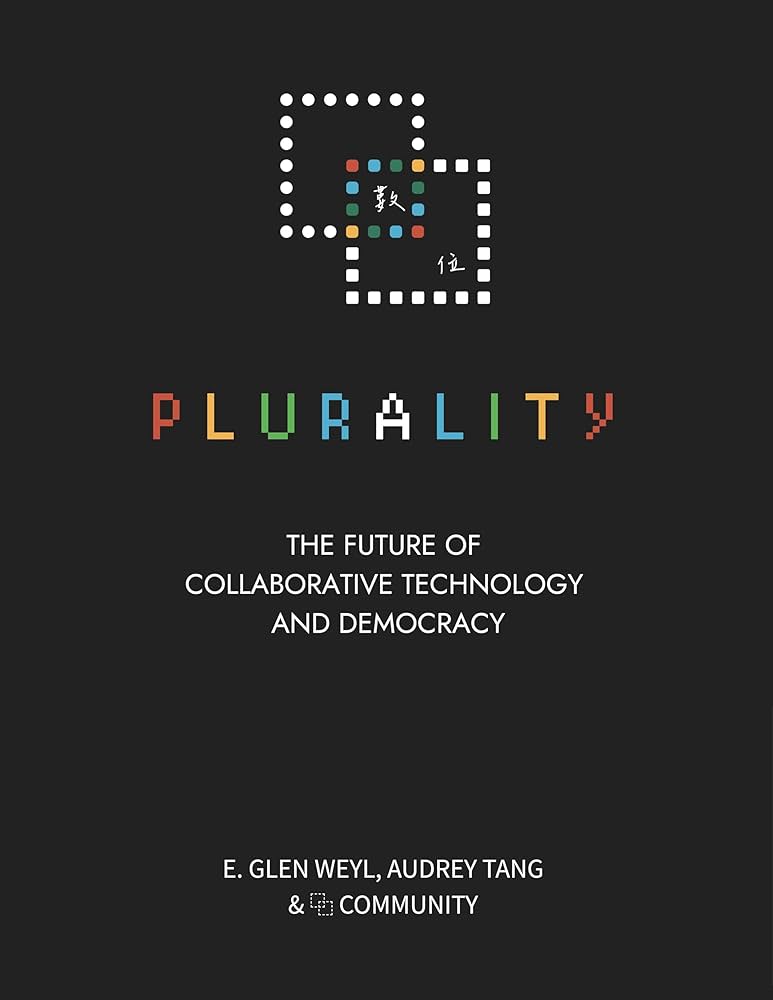
I got my mail-in ballot for November’s U.S. election yesterday, and plan to vote tomorrow.
For the first time in my voting life, I’ve been following little of the on-going campaign–beyond reviewing the Harris economic plan (detail that has probably come too late for most voters in a truncated election cycle) and wondering about her objectives for the war in Ukraine (is she for setting Russia back or accommodating it?) Stifiling my interest further has been the ominous sense that whomever actually wins in a few weeks, the result will be so close that we’ll still be fighting about it in the courts and on our streets come January.
So instead of wallowing in here-we-go-again or what these divisions might mean for America’s commitments to the rest of the world, I’ve been diving into the work of two visionaries and some of their proposed solutions to the current grid-locks besetting democracy—E. Glen Weyl, an economist at Microsoft Research, and Audrey Tang, Taiwan’s Digital Technology Minister. For some years now, Weyl and Tang have been evangelists in the quest to use our digital technologies to bolster the ways that we sort through our differences and improve our governance in democratic countries.
I start by agreeing with Weyl, Tang and many many others that innovations like social networks and AI (along with blockchains and digital currencies) have largely been deployed to maximize private profits instead of to benefit the wider public over the past 25 years. The conclusion seems inescapable that these skewed priorities have contributed to our feelings of helplessness about what-comes-next and the shape of our futures more generally.
But with Weyl and Tang, I also believe that we can use these same digital innovations in ways that promote the kinds of conversations and consensus-building that are necessary for functioning democracies. Indeed, doing so has already enabled a few fortunate governments (like Taiwan’s) to manage crises like the coronavirus pandemic with greater unity and far, far fewer “casualties” than almost anywhere else on earth.
Tang was instrumental in Taiwan’s effort, and in light of it she joined with Weyl and more than 100 other on-line collaborators to co-author a primer on how our digital technologies can be deployed to support democratic processes and reduce our political divides. It’s called “Plurality: The Future of Collaborative Technology and Democracy.”
My aim today is to describe some of Plurality’s proposals and (via several links) point you in the direction of the wider discussion that these visionaries are hosting.
Weighing possible solutions seems a healthier way to spend one’s time these days than dreading the slow-motion trainwreck that seems likely to recur in America over the next few months.

Before the preview of coming attractions that Audrey Tang contributed to in Taiwan, a few words that might be necessary about the Taiwanese.
Westerners sometimes harbor the view that the Taiwanese people are prone to harmony than divisiveness—or what Tang laughingly characterizes “as acting like Confusius robots”—but in reality they govern themselves very differently. The primary political and social divides in Taiwan are over whether to accommodate China’s various threats to its sovereignty or to resist them. But there are myriad, leser divides that beset this restlessly modern nation, and one or more of them could easily have produced a horrible result when its population was challenged by the coronavirus a few years back.
Instead, Taiwan already had some meaningful experience using digital access to provide greater citizen engagement in how the nation solved problems and responded to threats. According to an article in Time called “Taiwan’s Digital Minister Has an Ambitious Plan to Align Tech With Democracy,” after the country’s martial law era that ended in 1987, it’s citizens embraced computers and internet access enthusiastically because they enabled them to publish books without state sponsorship and communicate without state surveillance. According to Time, it was feelings of liberation assisted by technology that also fueled:
the rise of the g0v (gov zero) movement in 2012, led by civic hackers who wanted to increase transparency and participation in public affairs. The movement started by creating superior versions of government websites, which they hosted on .g0v.tw domains instead of the official .gov.tw, often attracting more traffic than their governmental counterparts. The g0v movement has since launched more initiatives that seek to use technology to empower Taiwanese citizens, such as vTaiwan, a platform that facilitates public discussion and collaborative policymaking between citizens, experts, and government officials.
For example, these gov-zero improvements proved instrumental when Uber launched its car service in Taiwan, sparking a powerful backlash. Tang and Weyl recalled what transpired next in a post that announced their Plurality concept:
When Uber arrived in Taiwan, its presence was divisive, just as it has been in much of the world. But rather than social media pouring fuel on this flame, the vTaiwan platform that one of us developed as a minister there empowered citizens opining on the issue to have a thoughtful, deliberative conversation with thousands of participants on how ride hailing should be regulated. This technology harnessed statistical tools often associated with AI to cluster opinion, allowing every participant to quickly digest the clearest articulation of the viewpoints of their fellow citizens and contribute back their own thoughts. The views that drew support from across the initial lines of division rose to the top, forming a rough consensus that ensured the benefits of the new ride hailing tools while also protecting workers’ rights and was implemented by the government.
In 2016, when Taiwan faced mass protests over an impending trade deal with China, Tang again played an instrumental role during protestors’ 24-day occupation of the country’s legislative chamber by enabling the protestors to peacefully boardcast their views on digital platforms and avoid a longer crisis. Shortly thereafter, Tang was appointed Taiwan’s digital minister without portfolio, in 2022 she became her country’s first Minister for Digital Affairs, and last year was appointed board chair of Taiwan’s Institute of Cyber Security.
The formal appointments in 2022 and 2023 followed Tang’s assistance throughout the pandemic using “pro-social” instead of “anti-social” digital media, which she described in an interview on the TED talks platform as being “fast, fair and fun” approaches to what could easily have become a country-wide calamity.
When word first came from China about a “SARs like” viral outbreak in Wuhan, Taiwan quickly implemented quarantine protocols at all points of entry, while simultaneously insuring that there were enough “quarantine hotels” to stop the spread before it could start.
Fairness via digital access and rapid dissemination of information, about say medical mask availability, was also critical to maintaining calm during those early pandemic months. As Tang recounted:
[N]ot only do we publish the stock level of masks of all pharmacies, 6,000 of them, we publish it every 30 seconds. That’s why our civic hackers, our civil engineers in the digital space, built more than 100 tools that enable[d] people to view a map, or people with blindness who talk to chat bots, voice assistants, all of them can get the same inclusive access to information about which pharmacies near them still have masks.
Taiwan’s rapid challenges to unfounded rumors before they had the chance to spread included another key element: the effectiveness of viral humor as a antidote to panic buying and similar anxiety-driven behaviors. Here’s Tang again:
[I]n Taiwan, our counter-disinformation strategy is very simple. It’s called ‘humor over rumor.’ So when there was a panic buying of [toilet] tissue paper, for example, there was a rumor [circulating] that says, ‘Oh, we’re ramping up mass production, masks use the same material as [toilet] tissue papers, and so we’ll run out of [toilet] tissue soon.’ [So to counter the rumor] our premier digitally shared a very memetic picture that I simply have to share with you. He shows his bottom, wiggling it a little bit, and then the large print says ‘Each of us only have one pair of buttocks.’ And of course, the serious table [that he also shared] shows that tissue paper came from South American materials, and medical masks come from domestic materials, and there’s no way that ramping up production of one will hurt the production of the other. And so that went absolutely viral. And because of that, the panic buying died down in a day or two. And finally, we found out the person who spread the rumor in the first place was the tissue paper reseller.
Through the use of digital tactics and strategies like these, Taiwan got fairly deep into the pandemic before it reported a single case of the coronavirus among the locals. In many ways that was because, as Time reported, “Taiwan leads the world in digital democracy.” It not only shares vital information with its citizens in a timely and engaging format, it consistently provides them with digital access to their government so that issues of public interest can be debated and often resolved.
Notwithstanding this momentum, in Plurality Tang and Weyl foresee even greater public benefit when democratic processes are more closely aligned with technology.

Some of these pro-social benefits involve counteracting the most anti-social effects of artificial intelligence (AI), blockchains and crypto-currencies when they introduce disruptions into the democratic conversation. As reported in the Time article:
Plurality argues that each of these [technological innovations] are undermining democracy in different, but equally pernicious ways. AI systems facilitate top-down control, empowering authoritarian regimes and unresponsive technocratic governments in ostensibly democratic countries. Meanwhile, blockchain-based technologies [like crypto-currencies] atomize societies and accelerate financial capitalism, eroding democracy from below. As Peter Thiel, billionaire entrepreneur and investor, put it in 2018: ‘crypto is libertarian and AI is communist.”
To elaborate on the substance of these threats a bit, it’s clear that AI’s ability to muster and re-direct vast amounts of information gives governments with anti-democratic tendencies the ability to manage (if not control) their citizens. Moreover, it is block-chains’ and crypto currencies’ ability to shelter transactions (if not entire markets) from regulatory control that can undermine a country’s ability to “conduct business” in ways that serve the interests of its citizens. Tang and Weyl argue that more robust digital democracies can help to resist these “pernicious” effects in myriad ways.
But these are just the defensive advantages; there is also a better world that they’d like to build with digital building blocks. As Tang and Weyl described it while announcing the Plurality concept and book, what has already been accomplished in Taiwan’s digital democracy:
just scratches the surface of how technology can be designed to perceive, honor and bridge social differences for collaboration. New voting and financing rules emerging from the Ethereum ecosystem [which also relies on blockchain technology] can reshape how we govern the public and private sectors; immersive virtual worlds are empowering empathetic connections that cross lines of social exclusion; social networks and newsfeeds can be engineered to build social cohesion and shared sensemaking, rather than driving us apart.
From where I sit this morning, I can stew in the bile and trepidation of America’s current election cycle or try to conjure a better future beyond the digital mosh pit of Twitter/X and much that appears on our news screens every day.
Tang, Weyl and Plurality are providing a platform for reinvigorating a democracy like ours by aligning it with digital technologies that can be put to much better uses than we’ve managed until now.
Tomorrow, I’d rather be voting for a robust future that our tech could enable if only we wanted it to.
+ + +
In line with two recommendations in Plurality, previous postings here have considered how community theater and a virtual reality headset can foster both engagement and empathy around issues like policing and homelessness (“We Find Where We Stand in the Space Between Differing Perspectives”) and how to guide the future of AI with a public-spirited “moon-shot mentality” instead of leaving its roll-out (as we seem to be doing today) to “free market forces” (“Will We Domesticate AI in Time?”).
This post was adapted from my September 29, 2024 newsletter. Newsletters are delivered to subscribers’ in-boxes every Sunday morning, and sometimes I post the content from one of them here in lightly edited form. You can subscribe by leaving your email address in the column to the right.
[…] to enable more robust democratic exchange and collaboration, as I recently discussed in “Making Technology Serve Democracy.” […]